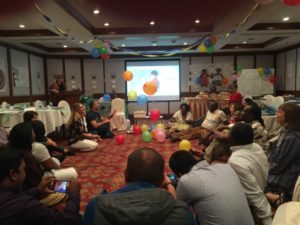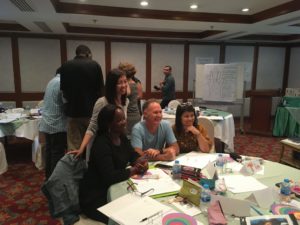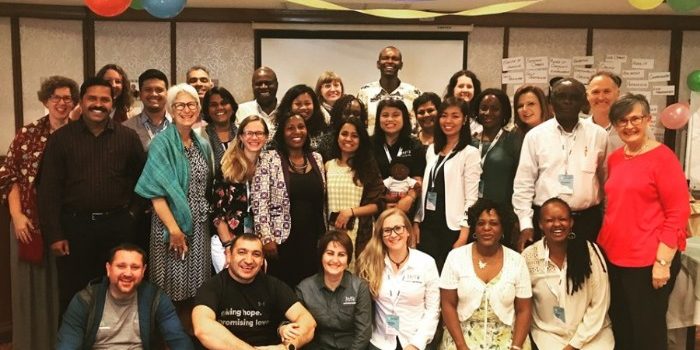“I am totally surprised, puzzled, shocked to learn that child-related issues are global/universal!” (India)
“I leave this room a different mother, employee, and child of God.” (Kenya)
“I’ve become more aware of children’s inherent dignity.” (Thailand)
“I will want to call together my fellow pastors to the task of our responsibilities towards children.” (Benin)
“I look forward to using this in my family and hopefully with our project partners who can then pass it on.” (Thailand)
“Awesome! Needed! Has to be spread!” (Ukraine)
 It was our joy to receive this feedback after launching Loom’s newest curriculum, Next Steps: Critical Interventions for Working with Children at Risk. Twenty-seven participants from over ten nations walked with us for two days as we discussed child growth and development, community structures and interventions, brain development, trauma, and much more. This curriculum, a 12-hour training based on our Celebrating Children Workshop, was intended to make it easier for leaders to access and multiply needed training around the world. We were encouraged by the material’s open reception and the feedback which confirmed that yes, this training was both needed and reproducible.
It was our joy to receive this feedback after launching Loom’s newest curriculum, Next Steps: Critical Interventions for Working with Children at Risk. Twenty-seven participants from over ten nations walked with us for two days as we discussed child growth and development, community structures and interventions, brain development, trauma, and much more. This curriculum, a 12-hour training based on our Celebrating Children Workshop, was intended to make it easier for leaders to access and multiply needed training around the world. We were encouraged by the material’s open reception and the feedback which confirmed that yes, this training was both needed and reproducible.
We were so encouraged to see the “aha” moments that participants shared, making connections between their goals for the children in their organization’s care, and the interventions needed to reach them. Discussions on the innate dignity of each child, how to listen to children, and the long-reaching impact of trauma were full of questions and insights from those who knew what it meant to be “in the trenches” of caring for children whom adults and systems have failed. Together, participants shared stories full of laughter and tears, reminding each other that they were not alone.
The most powerful moment of the two days was the final session, when participants had a chance to share the legacy they hope to leave for their countries, communities, and the children in their care. Here are a few examples of what they shared:
“I want to leave a legacy of compassionate, curious and loved children.”
“I want to leave a legacy that every child is a gift, they are wanted, they are loved, they are valued and appreciated.”
“I want to leave a legacy of a world that’s more just and where children can thrive.”
“I want to leave a legacy that I fought, defended, was an advocate for the cause of orphans.”
“I want to leave a legacy that no matter what, that I will love children unconditionally.”
“I want to leave a legacy that all children are raised in family-based care, with safety and permanency.”
“I want to leave a legacy of children that are resilient, to know that they are valued, loved, and have a future.”
 It was an honor to stand with them in this moment, and we have no doubt that each will go on to make a difference in the lives of many children and their families. We celebrate their passion, love, and integrity, and we pray that these two days will give them renewed courage to continue working towards the best outcomes for children all over the world.
It was an honor to stand with them in this moment, and we have no doubt that each will go on to make a difference in the lives of many children and their families. We celebrate their passion, love, and integrity, and we pray that these two days will give them renewed courage to continue working towards the best outcomes for children all over the world.
We chose the name Next Steps for the curriculum because we recognized that every one of us is a lifelong learner. No matter how long we have worked with children or studied trauma, there is always a step further we can take. For each one of us, this “next step” will be done in the context of our community and culture – and it will require collaboration. For the first step of change is always recognizing that we cannot create change alone.
So what about you? What is the next step you are willing to take for the wellbeing of vulnerable children in your community, and communities around the world?
Whatever it is, go as a lifelong learner, and don’t go alone. True change happens when we take the next step together, then pass it on.








